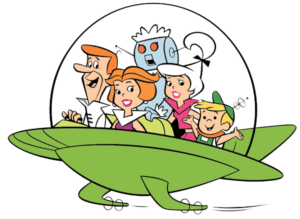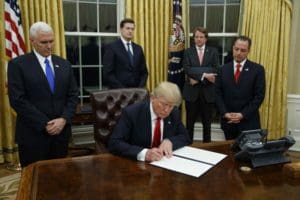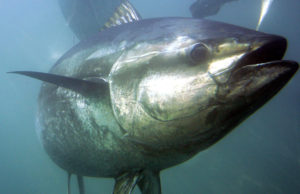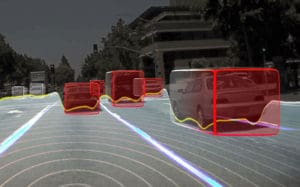 I remember being a kid and watching re-runs of the Jetsons – you know, the futuristic Flintstones. The show was set in a non-specific future utopia filled with robots, flying cars, and all sorts of other space-age contraptions. Every time I watched it, I couldn’t help but think what a wonderful world. But it recently dawned on me that we are closer to living the life of the Jetsons than we even realize. Think about it, the Jetsons had Rosie, the robot housekeeper. Well, we have self-driving vacuums that clean our houses, not to mention other forms of robots that help us in everyday tasks. The Jetsons also had 3D televisions and video calls. Guess what, we have those too. The Jetsons basically had a smart house, and with the advent and the Internet of Things (IoT), we now have smart, connected appliances in our houses. The only thing that was missing was the flying car. Well, Uber’s Chief Product Officer Jeff Holden announced that Uber intends to test flying cars within three years near Dallas and Dubai. This announcement follows a white paper published in October that outlined Uber’s vision of a flying car network that can soar above freeways. This is the final piece of the puzzle for the Jetsons life I always thought I was meant to live. And who knows, maybe in a few years, we will be quoting Dr. Emmet Brown – “Where we’re going, we don’t need roads.”
I remember being a kid and watching re-runs of the Jetsons – you know, the futuristic Flintstones. The show was set in a non-specific future utopia filled with robots, flying cars, and all sorts of other space-age contraptions. Every time I watched it, I couldn’t help but think what a wonderful world. But it recently dawned on me that we are closer to living the life of the Jetsons than we even realize. Think about it, the Jetsons had Rosie, the robot housekeeper. Well, we have self-driving vacuums that clean our houses, not to mention other forms of robots that help us in everyday tasks. The Jetsons also had 3D televisions and video calls. Guess what, we have those too. The Jetsons basically had a smart house, and with the advent and the Internet of Things (IoT), we now have smart, connected appliances in our houses. The only thing that was missing was the flying car. Well, Uber’s Chief Product Officer Jeff Holden announced that Uber intends to test flying cars within three years near Dallas and Dubai. This announcement follows a white paper published in October that outlined Uber’s vision of a flying car network that can soar above freeways. This is the final piece of the puzzle for the Jetsons life I always thought I was meant to live. And who knows, maybe in a few years, we will be quoting Dr. Emmet Brown – “Where we’re going, we don’t need roads.”
And now, on to the news:
- Trump drops “NAFTA pullout” threat
- WTO says Mexico can seek millions from US in tuna dispute
- Nippon Express seizes chance in halal food transport
- Nvidia goes public with self-driving truck ambitions
- Amazon builds team for autonomous vehicle technology
- Panera to add 10,000 jobs by the end of 2017 as it expands delivery
 President Trump and his administration have officially said they are no longer considering leaving the North American Free Trade Agreement (NAFTA). While Trump has said in the past that the US is getting the short end of the stick in most trade deals, and he would certainly look to renegotiate or pull out of such agreements, NAFTA will not be one of those he will consider pulling out of. This comes on the heels of intense lobbying from business leaders and lawmakers to make sure the US remained part of NAFTA. According to the White House, President Trump is actively involved in discussions with Mexican President Enrique Peña Nieto and Canadian Prime Minister Justin Trudeau to potentially renegotiate the deal to make it beneficial for all parties.
President Trump and his administration have officially said they are no longer considering leaving the North American Free Trade Agreement (NAFTA). While Trump has said in the past that the US is getting the short end of the stick in most trade deals, and he would certainly look to renegotiate or pull out of such agreements, NAFTA will not be one of those he will consider pulling out of. This comes on the heels of intense lobbying from business leaders and lawmakers to make sure the US remained part of NAFTA. According to the White House, President Trump is actively involved in discussions with Mexican President Enrique Peña Nieto and Canadian Prime Minister Justin Trudeau to potentially renegotiate the deal to make it beneficial for all parties.
 Mexico has long argued that the US labeling rules for dolphin-safe tuna are not fair to Mexico in terms of accessing the US market. The World Trade Organization (WTO) agrees with Mexico on this point, saying Mexico may seek $163 million annually from the US in retaliatory measures. Dolphin-safe labeling is meant to ensure minimal dolphin fatalities in commercial tuna fishing, and has been in place since 1990. The US allows the dolphin-safe label on cans of tuna that meet the “no-kill” standards in place. Mexico claims that is has brought down dolphin deaths to the international standard, but is still refused the dolphin-safe label. Mexico had claimed that its annual losses amounted to $472.3 million, far exceeding the U.S. claim of $8.5 million to $21.9 million.
Mexico has long argued that the US labeling rules for dolphin-safe tuna are not fair to Mexico in terms of accessing the US market. The World Trade Organization (WTO) agrees with Mexico on this point, saying Mexico may seek $163 million annually from the US in retaliatory measures. Dolphin-safe labeling is meant to ensure minimal dolphin fatalities in commercial tuna fishing, and has been in place since 1990. The US allows the dolphin-safe label on cans of tuna that meet the “no-kill” standards in place. Mexico claims that is has brought down dolphin deaths to the international standard, but is still refused the dolphin-safe label. Mexico had claimed that its annual losses amounted to $472.3 million, far exceeding the U.S. claim of $8.5 million to $21.9 million.
 Nippon Express has announced plans to expand its transportation services that meet Islamic dietary rules. The logistics company is betting on growth in halal demand in Japan and across other parts of Asia. In order to transport the food, the company has needed halal certification in its distribution centers in Tokyo and Fukuoka. Now, the company will use these DC’s as jumping off points to grow their transportation of halal food and other goods. The company is betting that demand for halal-compliant services will grow, along with the rising number of Muslim visitors to Japan and the surging popularity of Japanese food in other parts of Asia. Nippon Express said it is considering seeking halal certification for more of its distributions centers inside and outside Japan.
Nippon Express has announced plans to expand its transportation services that meet Islamic dietary rules. The logistics company is betting on growth in halal demand in Japan and across other parts of Asia. In order to transport the food, the company has needed halal certification in its distribution centers in Tokyo and Fukuoka. Now, the company will use these DC’s as jumping off points to grow their transportation of halal food and other goods. The company is betting that demand for halal-compliant services will grow, along with the rising number of Muslim visitors to Japan and the surging popularity of Japanese food in other parts of Asia. Nippon Express said it is considering seeking halal certification for more of its distributions centers inside and outside Japan.
 Nvidia has gone public with its plans to enter the autonomous truck market. Nvidia is known for producing graphics chips that power a wide range of video game technologies. Recently, however, the company has grown through its investments in autonomous and connected car technologies. Nvidia has recently launched a partnership with Paccar, who makes Kenworth, Peterbilt, and DAF trucks, to develop an autonomous truck platform. Paccar said it has created a “proof-of-concept self-driving truck” built using Nvidia’s Drive PX platform. It is not surprising to see more tech companies jump into the autonomous truck discussion as it is an area that is prime for take-off in the not-too-distant future.
Nvidia has gone public with its plans to enter the autonomous truck market. Nvidia is known for producing graphics chips that power a wide range of video game technologies. Recently, however, the company has grown through its investments in autonomous and connected car technologies. Nvidia has recently launched a partnership with Paccar, who makes Kenworth, Peterbilt, and DAF trucks, to develop an autonomous truck platform. Paccar said it has created a “proof-of-concept self-driving truck” built using Nvidia’s Drive PX platform. It is not surprising to see more tech companies jump into the autonomous truck discussion as it is an area that is prime for take-off in the not-too-distant future.
 Speaking of autonomous trucks, Amazon has put together a team to focus on autonomous vehicle technology. People familiar with the matter have reported that the team “consists of about a dozen employees who focus more broadly on how Amazon can deliver its own products more quickly but who aren’t necessarily building self-driving vehicles.” For Amazon, developing its own fleet of autonomous trucks makes a lot of sense as it continues to push forward in its quest to become a full-service logistics company. While it already has its private fleet of trucks and planes, is developing drone delivery technology, and works as a broker for ocean transport, autonomous trucks are the likely next step. In January, Amazon won a patent for a network that helps autonomous vehicles adjust in changing driving environments, such as reversible lanes. Having its own fleet to use this technology seems like a no-brainer.
Speaking of autonomous trucks, Amazon has put together a team to focus on autonomous vehicle technology. People familiar with the matter have reported that the team “consists of about a dozen employees who focus more broadly on how Amazon can deliver its own products more quickly but who aren’t necessarily building self-driving vehicles.” For Amazon, developing its own fleet of autonomous trucks makes a lot of sense as it continues to push forward in its quest to become a full-service logistics company. While it already has its private fleet of trucks and planes, is developing drone delivery technology, and works as a broker for ocean transport, autonomous trucks are the likely next step. In January, Amazon won a patent for a network that helps autonomous vehicles adjust in changing driving environments, such as reversible lanes. Having its own fleet to use this technology seems like a no-brainer.
 And finally, Panera Bread is pushing ahead to make delivery services available at more of its cafes. The retailer has indicated it will hire 10,000 additional employees by the end of the year to help with the new initiative. Panera says that approximately 75 percent of the new employees will be delivery drivers, while the remaining 25 percent will be café workers. The company will opt for an “Uber” method of delivery, which means it will not have to invest in a fleet of vehicles. Instead, vetted drivers will be able to deliver food to customers. According to Panera, the minimum menu purchase is $5 and the typical delivery fee will be $3.
And finally, Panera Bread is pushing ahead to make delivery services available at more of its cafes. The retailer has indicated it will hire 10,000 additional employees by the end of the year to help with the new initiative. Panera says that approximately 75 percent of the new employees will be delivery drivers, while the remaining 25 percent will be café workers. The company will opt for an “Uber” method of delivery, which means it will not have to invest in a fleet of vehicles. Instead, vetted drivers will be able to deliver food to customers. According to Panera, the minimum menu purchase is $5 and the typical delivery fee will be $3.
That’s all for this week. Enjoy the weekend and the song of the week, What a Wonderful World by Louis Armstrong.


















Seems like all these on demand services like Uber or Doft or Amazon are the future of freight transportation!